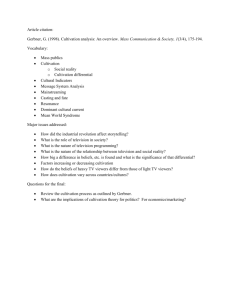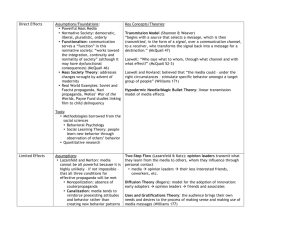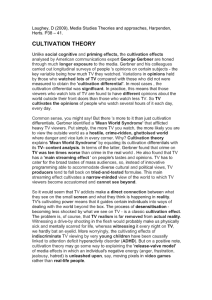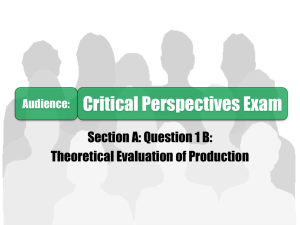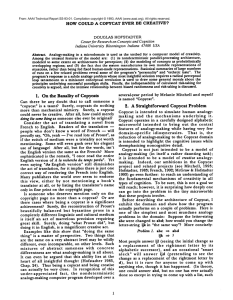Regulation: Theoretical Ideas
advertisement
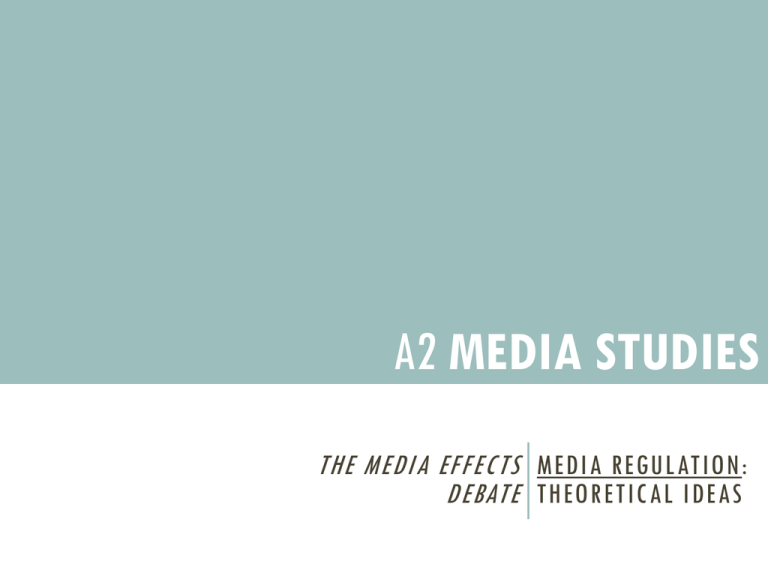
A2 MEDIA STUDIES THE MEDIA EFFECTS MEDIA REGULATION: DEBATE THEORETICAL IDEAS RESEARCH ACTIVITY: TASK: Research the following theories relating to the Media Effects Debate – Feedback next lesson. Cultivation Theory Uses & Gratification Model Desensitisation Theory Copycat Theory Catharsis Theory Reception Theory Two-Step Theory THINGS TO CONSIDER: It is unclear that there is any link between the consumption of violent media texts and violent imitative behaviour. It is clear that passive theories are flawed as many people watch violent or troubling texts and appear to not be influenced. Therefore active theories are more easily applied to modern day/contemporary texts. CULTIVATION THEORY THE MEDIA EFFECTS MEDIA REGULATION: DEBATE THEORETICAL IDEAS Video Link: www.youtube.com/watch?v=G37OqYfSSYk CULTIVATION THEORY GEORGE GERBNER (1976) Gerbner claims that “Persistent long term exposure to television content has measurable effects on the perceptual worlds of audience members”. Can TV influence or ‘cultivate’ a viewers idea of the every day world? Over exposure can blur an audiences attitude as it is the main source of story telling in society – socialisation. Cultivation occurs over time (not immediately) and shapes the viewers sense/perception of reality. Heavy viewers (4+ Hours per day) are exposure to more violence and are therefore affected by ‘Mean World Syndrome. Gerbner found that heavy viewers developed a misconception of the world by overestimating how much violence actually occurs in their communities – particularly when compared to less media users ‘realistic’ world. The theory assumes that the audience is passive in nature, resulting in the media being a big influence on their ideas and life choices. Therefore eventually, their views and values regarding the world will come to resemble that of the medias… very dangerous. TV can condition you to be scared of certain people or situations. The more frequently an image or event is depicted on screen, the greater significance the viewer attaches to it in the real world. The more you watch, the more passive, nervous and frightened you become. CULTIVATION THEORY APPLY THE THEORY USES & GRATIFICATION THEORY THE MEDIA EFFECTS MEDIA REGULATION: DEBATE THEORETICAL IDEAS Video Link: www.youtube.com/watch?v=6y-h5lNol-0 USES & GRATIFICATION DENIS MCQUAIL (1974) McQuail claims that “People use the media and its many texts to their advantage, this is personal and specific, in order to meet their individual needs”. Audiences gain pleasure from the familiarity of recognisable elements (content, style etc.). They know that Films and TV shows will fulfil certain expectations (Using genre as a selection device). McQuail, Blumler, Katz & Brown stated that audience consumption is based on highly active choices & personal preferences. Individuals have different uses for texts, & instead of mindless entertainment, we all expect to get something from it (gratification). SURVEILLANCE (Cognitive Needs): People access the media to acquire specific information. They want to gain more knowledge on a certain event/topic, or perhaps learn something useful. PERSONAL IDENTITY (Affective Needs): People use the media to satisfy their emotional needs. Audiences relate to characters and sympathize/celebrate with them. Personal Choices often reflect lifestyle choices. PERSONAL RELATIONSHIPS (Social Integrative Needs): Social networking sites satisfy social integrative needs by informing them of peer relationships, statuses etc. It can help become part of community/aid social integration. DIVERSION (Escapism/Tension Free Needs): People may use tension free needs as an outlet. The media can help a person escape and relieve tension through entertaining or elaborate content. USES & GRATIFICATION MODEL APPLY THE THEORY DESENSITISATION THEORY THE MEDIA EFFECTS MEDIA REGULATION: DEBATE THEORETICAL IDEAS Video Link: www.youtube.com/watch?v=HiqBZpfNQf8 DESENSITISATION THEORY MARY COVER JONES (1958) Psychologist ‘Mary Cover Jones’ believes the more violence viewers are exposed to in the media over a period of time, the less sensitive we become to it. The violence no longer seems to bother them or bothers them less than it did before It is a behavioural state that people may experience after being exposed to so much violence in the media, it may not have a strong emotional impact on them anymore in the actual world (Reality). As a result - the concern is that desensitisation may occur when something violent happens in real life, leaving the viewer to become immune to the general shock of these action, making them too comfortable and possible able to perform these acts as they are no longer affected emotionally. 1973 The Exorcist - 1974 Texas Chainsaw Massacre - 2011 Human Centipede 2 These banned films are now available due to social change & the ‘RATINGS CREEP’. DESENSITISATION THEORY APPLY THE THEORY COPYCAT THEORY THE MEDIA EFFECTS MEDIA REGULATION: DEBATE THEORETICAL IDEAS Video Link: www.youtube.com/watch?v=D0u5zQNtQE0 COPYCAT THEORY LOREN COLEMAN (1999) Definition: Audiences will copy what they see in a media text, referring to how the media can influence and affect an audiences behaviour and how they think/act. The influence of this theory is how it psychologically prays off the fears and concerns of parents as well as many independent commissions and engages their parents to more actively monitor the Media that they use. This not only covers films, but also video games, especially with underage gaming on the rise, with games such as GTA & COD being predominantly played by young people. The main weakness is the opinion of the people regulating their children, as the preconception of danger varies from person to person, so one person's horror movie is another's comedy. Additionally, while short term effects of the media are easily monitored, the long term are not so easily monitored, and therefore the theory cannot be proven correct. The most notable example is the Jamie Bulger murder case (Blamed on Child’s Play 3). Additionally there are multiple cases of children with short tempers due to constant exposure to competitive and mature gaming and films. RESEARCH REAL LIFE CASES BLAMED ON THE MEDIA. https://en.wikipedia.org/wiki/Copycat_crime COPYCAT THEORY APPLY THE THEORY
